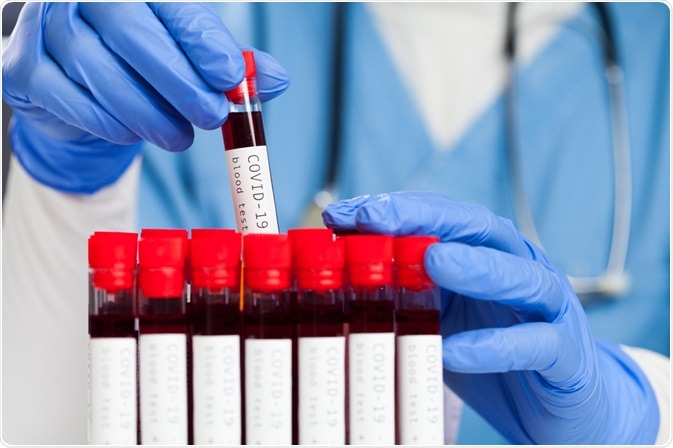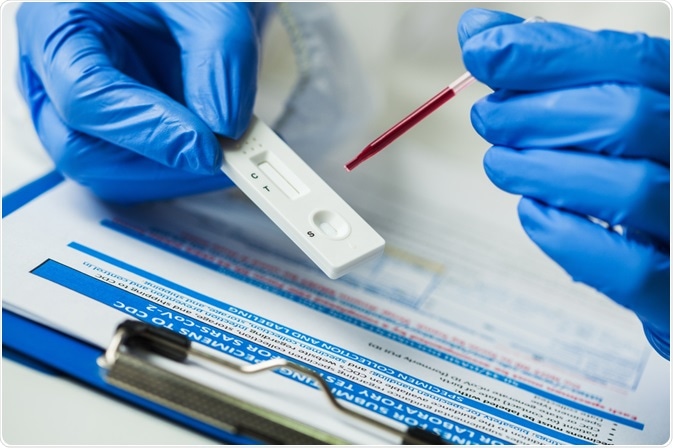A novel coronavirus that was first reported in China in December 2019 quickly led to a global pandemic. Named COVID-19, the virus has had a devastating effect on economies and healthcare systems worldwide.
 Image Credit: Cryptographer / Shutterstock.com
Image Credit: Cryptographer / Shutterstock.com
As it is highly contagious, the first defense against the transmission of the disease is restricting contact between infected and healthy people, but this depends on accurate and reliable diagnostic testing. Numerous serological tests for COVID-19 antibodies became rapidly available, but evidence for their accuracy is under question.
Transmission of COVID-19
COVID-19 is a highly contagious infection, with human-to-human transmission occurring through direct contact or respiratory droplets spread when an infected person coughs or sneezes.
Droplets also evaporate into aerosols which remain suspended in the air causing airborne transmission. Although COVID-19 is most contagious in the first three days following the onset of symptoms, infected people can transmit the virus up to two days before developing symptoms.
Asymptomatic patients, although less likely to transmit the virus, are still infectious. People remain infectious for approximately two weeks following symptom onset. This all means that accurate testing is very important to limit transmission.
Diagnostic testing
Given the scope and devastating impact of COVID-19, response strategies in the form of diagnostic testing to both monitor the course of the pandemic and design interventions to manage its spread, are essential.
Diagnostic testing early in an outbreak, when the non-specificity of the clinical presentation is at a peak, is essential for confirming diagnoses and implementing quarantine measures. Tracking the recent contacts of infected patients and testing them for COVID-19 is critical to intervene in the mass spread of the disease. Diagnostic testing can also identify at-risk groups and monitor the effectiveness of control tactics.
There are two types of tests: viral specimen tests which obtain samples from the upper or lower respiratory tract and test for current infection, and serological tests which are performed with blood samples and look for signs of a previous COVID-19 infection.
What are serological tests?
Serological tests (also known as antibody tests) are a diagnostic method that analyzes the antibodies and antigens in a patient’s blood sample. The presence of antibodies against a specific pathogen (an infectious agent such as a virus) indicates that the patient has been exposed to that pathogen.
Typically, antibody tests look at levels of immunoglobulin M (IgM) and immunoglobulin G (IgG). As IgM production is high shortly after exposure to a pathogen, but rapidly declines, a positive IgM result indicates present or recent infection. IgG antibodies remain in circulation for a longer duration and indicate past exposure.
Why are serological tests important for COVID-19?
Studies conducted on the transmission of COVID-19 to date have shown that up to 44% of those who test positive are asymptomatic. Therefore, an important strand of COVID-19 research includes antibody seroprevalence studies which consider the proportion of a population with COVID-19 antibodies in their blood. This allows us to:
- Understand the pattern of infections and design better population-level controls such as quarantine periods;
- Identify those without COVID-19 antibodies who may be at higher risk of infection during second and subsequent waves of COVID-19 outbreaks;
- Categorize populations who are at higher risk of developing more severe symptoms and complications, and conversely those most likely to be asymptomatic;
- Study the link between antibody presence, COVID-19 symptomology and population-level immunity.
 Image Credit: Cryptographer / Shutterstock.com
Image Credit: Cryptographer / Shutterstock.com
What are the limitations?
Antibody testing, especially if used to guide individual and societal decisions about quarantine and lockdown procedures, must be precise. However, current serological tests for COVID-19 vary in their accuracy, both with regards to sensitivity and specificity.
Testing is time-dependent
A test that is high in sensitivity will successfully detect the presence of COVID-19-specific antibodies and produce few false negative results. A specific test will detect only the presence of the specific antibodies of interest and produce few false positive results. However, as the presence of both IgM and IgG vary depending on when the infection occurred, the timing of testing is critical.
False positive and negative results
For this explanation, take the population prevalence of COVID-19 to be 5% . This translates to 5000 people with the infection within a population of 100,000.
Although it may sound impressive, if a test with 90% sensitivity and 90% specificity was given to 100,00 people, 4500 people would correctly test positive for COVID-19 antibodies, but 500 would incorrectly test negative (a false negative result). In the same population, 85,500 people would correctly test negative and 5000 would correctly test positive. However, a further 9500 people would incorrectly test positive (a false positive result).
The specificity of a test can be increased by increasing the threshold level of antibody to test positive. Whilst this would reduce the number of false positive results, it lowers the sensitivity thus increasing the number of false negatives.
References
Agyeman, A.A., Lee Chin, K., Landersdorfer, C.B., Liew, D. and Ofori-Asenso, R. (2020). Smell and Taste Dysfunction in Patients With COVID-19: A Systematic Review and Meta-analysis. Mayo Clinic Proceedings.
Anand, S., Montez-Rath, M., Han, J., Bozeman, J., Kerschmann, R., Beyer, P., Parsonnet, J. and Chertow, G.M. (2020). Prevalence of SARS-CoV-2 antibodies in a large nationwide sample of patients on dialysis in the USA: a cross-sectional study. The Lancet.
European Centre for Disease Prevention and Control. (n.d.). Q & A on COVID-19: Basic facts. [online] Available at: https://www.ecdc.europa.eu/en/covid-19/facts/questions-answers-basic-facts.
Jernigan, D.B. (2020). Update: Public Health Response to the Coronavirus Disease 2019 Outbreak — United States, February 24, 2020. MMWR. Morbidity and Mortality Weekly Report, [online] 69. Available at: https://www.cdc.gov/mmwr/volumes/69/wr/mm6908e1.htm.
Kumleben, N., Bhopal, R., Czypionka, T., Gruer, L., Kock, R., Stebbing, J. and Stigler, F.L. (2020). Test, test, test for COVID-19 antibodies: the importance of sensitivity, specificity and predictive powers. Public Health, [online] 185, pp.88–90. Available at: https://www.sciencedirect.com/science/article/pii/S0033350620302420 [Accessed 9 Jul. 2020].
Further Reading
Last Updated: Jan 11, 2021